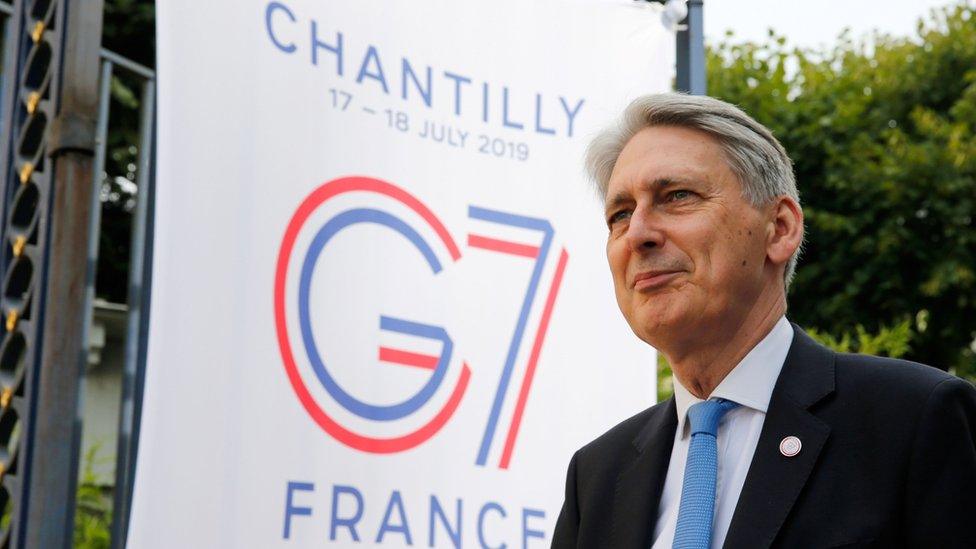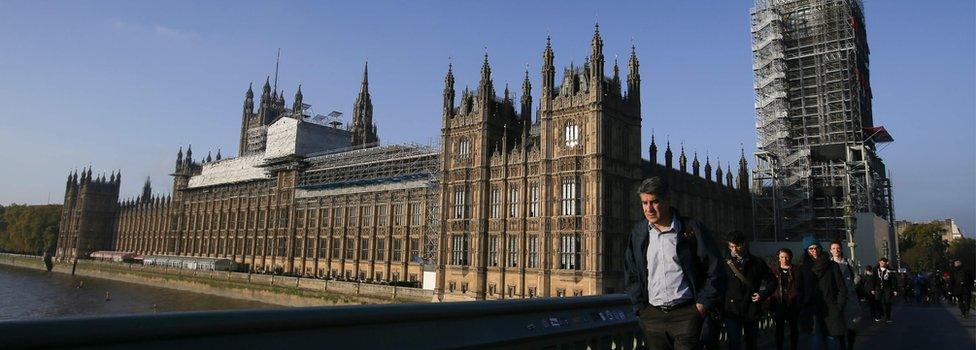Philip Hammond will 'not exclude' backing no confidence vote to stop no-deal Brexit
- Published
- comments

Chancellor Philip Hammond has indicated he may vote to bring down the next PM to stop a no-deal Brexit.
Asked whether he would back a motion of no-confidence in the government, he said he could "not exclude anything".
Mr Hammond also said he would do "everything in my power" to stop a future prime minister suspending Parliament to get a no-deal Brexit.
He was one of four cabinet ministers who abstained from a vote blocking the possibility of this happening.
The Commons vote was brought forward on Thursday by MPs who fear the next Conservative leader and prime minister will make the move - known as "prorogation" - to push through a no-deal Brexit and cut them out of the process.
Foreign Secretary Jeremy Hunt has discounted the possibility if he becomes prime minister, but his rival in the Conservative Party leadership race, Boris Johnson, has refused to give the same assurance.
In an interview with Le Monde, external and Süddeutsche Zeitung, external, Mr Hammond said he would "take steps to avoid an exit without agreement apart from an explicit parliamentary approval".
Speaking on Tuesday at the G7 conference in Paris, he told the French and German newspapers: "There should be a new and sincere attempt to reach a consensus.
"If we do not find a solution with the members, we may have to ask the British to give their opinion again, in one form or another."
Asked if he would rule out supporting a motion of no confidence - which, if successful, would bring down the government - he said: "I do not exclude anything for the moment."

What is a no-confidence vote?

It is a chance for MPs to hold a vote on whether they want the government to continue - and it has the power to trigger a general election.
Any MP can propose a motion of no confidence, but that doesn't mean it would be debated.
However, if the leader of the opposition introduces the motion, convention means the government will provide time for a debate to take place.

Mr Hammond also said another extension to Brexit was "absolutely necessary" in practice, as there was not enough time to renegotiate with the EU ahead of 31 October deadline.
He added: "If the next government is sincere in its desire to reach an agreement with Europe, it must try to get more time. If it does not, the British parliament will insist on getting a new postponement.
"I will remain a member of the House of Commons. I will do everything in my power from my position to make sure that parliament blocks a Brexit without agreement."

How 'Gawkeward' will Hammond be?
By Jessica Parker, political correspondent
The so-called "awkward squad" - a group of Conservative Eurosceptic MPs - has for a long time made life tricky for David Cameron and Theresa May.
With the pro-Brexit Boris Johnson apparently on the cusp of becoming PM, the expectation is that a chunk of the group could get government jobs. And the rest will surely hold fire on their new boss, at least for a while.
Taking their place… the "Gaukeward squad", named after current Justice Secretary David Gauke.
The current projection is that it will be made up of Mr Gauke, Chancellor Philip Hammond and a good handful of other Tory MPs who avidly oppose a no-deal Brexit.
Just how Gaukeward will they be? Mr Hammond's comments on potentially supporting a no-confidence vote suggest he - in principle at least - is willing to go pretty far to make his point.
But is this just tough talk in order to let off some loud warning shots? We won't know until the crunch moment - if and a when Parliament finds itself confronted with the very real and immediate prospect of a no-deal Brexit.

What does proroguing Parliament mean?
Mr Hammond said Mr Johnson, the frontrunner in the Tory leadership race, was "a more complex personality than it sometimes seems", and was "a mainstream Conservative on all topics except Brexit".
But he pleaded for the EU to have patience with some of Mr Johnson's Brexit-backing supporters in the Conservative Party who were being "deliberately noisy, rude and inconsiderate... to make the Europeans so tired that they ask us to leave".
He added: "Please, do not listen to the the few noise-makers."
Parliamentary consent
Pro-Remain Tory Dominic Grieve told the BBC that he thought a "substantial number" of his party would be willing to support a vote of no confidence in the government to stop a no-deal Brexit.
He said: "I'm going to be working with colleagues who share my view that no deal would be very bad for the country to try to make sure that the government cannot push us into no deal without Parliament having consented to it."
Health minister Stephen Hammond - who abstained in Thursday's vote - said he would not rule out supporting a no-confidence vote in his own government if its policy became pursuing a no-deal Brexit, telling BBC Radio 4's Today programme: "A lot of people were taught that you must put the interest of the country before yourself."
But leading Brexiteer and Tory MP Jacob Rees-Mogg told the same programme those trying to prevent it were "not saying what they believe", and their intention was to "snub the British voters" and stop Brexit altogether.
He did, however, say prorogation was a possibility "for a day or two" to stop parliamentary procedures being "upended" by backbenchers trying to block the UK leaving the EU.
'Up to the UK'
If MPs fail to support a Brexit deal agreed between UK and EU by 31 October, the legal default is to leave with no deal on that date.
Both contenders to be the next prime minister said they want to keep to the date and renegotiate with the EU, leaving with a deal.
But Mr Hunt and Mr Johnson have also said they would keep no deal on the table to strengthen negotiations, despite Parliament voting to rule the option out.
The EU has consistently said the withdrawal agreement is closed and cannot be changed.
The incoming president of the European Commission, Ursula von der Leyen, has said she hopes the UK remains in the EU, but it was up to British authorities to "sort its side of things on Brexit".
Asked about Mrs von der Leyen's position, German Chancellor Angela Merkel said on Monday she understood that "if the UK wishes for more time [e.g. another delay to Brexit], then they would have more time", but it was "up to the UK".
She praised her "cooperative relationship" with Theresa May, adding: "She has not had an easy time dealing with this difficult question. I always found her to be a reliable and collegial partner, and I thank her for that."
But she added: "We now have the position that there will be a new PM, and then we have to watch what that person decides."